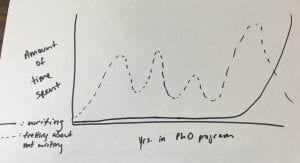My tolerance for imperfection is perhaps most apparent in the kitchen. My friends and family joke about my laxness with recipes and lack of respect for key ingredients — most recently, when I persevered in making a chili without any chili powder. (Surely, paprika with some cayenne would do the trick?) The end product often isn’t half bad and, even more importantly, I have dinner. Sure, I sacrifice some perfection along the way, but it’s worth it to produce something when the alternative is…likely…nothing (or takeout).
The “good enough” mantra
There’s a common idea in graduate school that one should adopt a “this is good enough” or “this’ll do” approach. I’m a big fan. Faced with a constant onslaught of work: reading, writing, class assignments, research, meetings, professional development — perfectionism is not really an option. Neither is being sloppy, which means this is really about prioritizing where you put your time and energy, knowing when to stop and when to push harder. This is still not something I’ve mastered, but appropriately I’m still practicing it without perfecting it.
Completing my doctoral dissertation, which I did last month, was an excellent opportunity to practice a “good enough” approach. A dissertation is a multi-year, multi-part research project through which you demonstrate your mastery of a topic — and also your mastery of managing such a project. Your topic is important, of course, but so is your execution. This involves prioritizing and, in some cases, allowing some portions to be less than perfection. I am very proud of the work I did during my PhD, a lot of which I owe to excellent mentorship and the freedom to pursue a potentially risky and “niche” topic (thankfully, in the interim third-party tools have increased significantly in visibility). With that pride is a recognition of the practicality that some parts could have been better. And that’s okay.
Fearing imperfection means you often don’t even start on a task but rather spend extensive time and energy fretting about it and how un-perfect it is likely to be. For example, I drew this only slightly ironic graph below about the relationship between time in a PhD program (x-axis), time spent fretting about writing (solid line), and actual time spent writing (dashed line; nod to Demetri Martin for nerdy graphs with comic intent). The differential is usually fear of imperfection. I imagine if I’d traded more of the fretting time with writing time earlier on!

Resolutions are stupid
This post is partly about completing my PhD and partly about the start of a new year, with its annoying emphasis on resolutions. People are notoriously bad at change and well-practiced at beating ourselves up about it — a problematic combination that intensifies come January 1, with commitments made to over-ambitious goals with only a binary of success or failure as an option.
I’m in favor of the resolution alternative: the “intention.” An intention is aspirational rather than punitive and invites a little more grace and self-compassion when I inevitably fall short. A therapist I worked with had a lovely practice of ending each session with setting an intention, with the phrasing “I am willing to practice ____.” Two opportunities for accepting less than perfection are embedded in that phrase. First, you’re asking yourself for a willingness, not a commitment. Second, you’re just going to practice something — it might not work at all. There’s a lot of “good enough” in that idea, not in the sense that you shouldn’t challenge yourself but that success and growth can take different forms.
Life is iterative
Why is good enough important? It produces something when the alternative may be nothing. Or something that is only bottled up in your head and your heart, unable to be shared with and improved by others. Writing, research, life – it is enhanced when you share and interact with others and then take that back to the drawing board and produce the next iteration. I have several writing projects I need to move forward in the next several months, and I’ll just have to be vulnerable in showing my writing partners and co-authors some less than pristine drafts. The alternative is to hide, fret, and procrastinate. Instead I am willing to practice some less-than-perfect writing. And maybe on the next go around I’ll manage to buy some chili powder.
